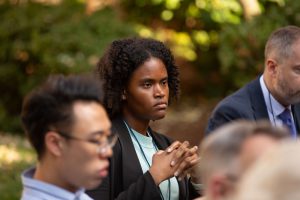In the last decade, states have come together to address the lack of rules in cyberspace via multilateral meetings such as the Open-Ended Working Group on Developments in the Field of Information Telecommunications in the Context of International Security (OEWG). As a Fellow at Temple Law’s Institute for Law, Innovation & Technology (iLIT) I, along with the iLIT team, have been tracking the evolving landscape of cyberspace rule formation through iLIT’s National Statements project. National statements are a state’s published views as to which laws of international law apply to cyberspace. Publication of national statements is a recent phenomenon. In fact, until about ten years ago there was no consensus as to the application of international law to cyberspace and states did not share their positions on the topic. Now, as more nations continue to publish their statements, areas of consensus, disagreement, and silence are emerging, and iLIT is analyzing these trends. iLIT’s National Statements project identifies and analyzes the various state positions regarding cyberspace through a lens of equity, inequality, and diversity.
Technology and cyberspace offer individuals, organizations, and governments the ability to communicate on a global scale and engage in complex dialogue. In 2023, US intelligence agencies notified the public that critical infrastructure components had been impacted by a state-sponsored Chinese hacking group dubbed “Volt Typhoon.” Volt Typhoon targeted a variety of critical industries such as telecommunications, energy, and transportation with the goal of causing massive disruption and havoc to American infrastructure. This attempt was thwarted in January 2024. However, the operation was not an outlier; in fact, these types of activities are common in cyberspace. While common, states do not have guidelines to govern, limit, or ensure accountability for actions done in cyberspace.
Through my work on the National Statements project, I had the opportunity to attend a convening of the Oxford process which is a multi-stakeholder initiative co-convened by Temple Law Professor Duncan Hollis and Oxford Professor Dapo Akande, on October of 2023. The Oxford Process focuses on the application of international law in cyberspace and seeks to clarify and further the development of the rules and norms of cyberspace. To support this effort, the Oxford Process produces statements on specific topics on international law protection in cyberspace with the most recent statement focusing on ransomware operations in cyberspace.
The experience was one that I will never forget. I could see the issues and topics I had been researching as a Fellow, being discussed by foreign ministry staff and legal advisors. The convening was a two-day affair held at Yale Law and consisted of four sessions with short presentations on topics such as the current landscape of cyberspace and the role of private actors in cyberspace, followed by in depth conversation from the participants. The conference allowed me to consider issues that I only encountered in scholarship and the national statements themselves. I learned about the influence of international humanitarian law in cyberspace, the role that process, responsibility and private actors have in cyberspace, and the processes by which rules develop in international law.
Prior to this conference, I was feeling nervous, hesitant, and full of the dreaded imposter syndrome. I questioned my place at the conference because I was just starting my professional career. Fears about inexperience and lack of professional accolades plagued my thoughts. As I prepared for the conference, I found myself doubting the knowledge that I possessed on the subject. It all came to a head once I had a discussion with the executive director of iLIT, Professor Laura Bingham, about my thoughts and concerns in attending the convening. Professor Bingham encouraged me to take this opportunity to learn from those around me and to “get out there.” I was still unsure, but I took this moment to reflect on who I was and what I could contribute to the conference. The shift in perspective allowed me to approach the Oxford Process as a learning experience and an entry as a professional in this field.
When attending the conference, I realized that the work I did on the National Statements Project developed my knowledge of the issues being discussed. I was by no means an expert, but I realized that the other participants are not experts either because the field of the intersection of international law and cyberspace itself is constantly developing. I also realized that while skills and knowledge are important, the confidence to put yourself out of your comfort zone is what will propel you to the next level. If I ruminated on my feelings of inadequacy and limited my engagement while attending the conference, I would not have learned nor developed as a professional. I would not have had the opportunity to network with representatives and international scholars about a topic that I am passionate about.
As a law student, you always hear about imposter syndrome but, it is not something that is exclusive to law school. It can impact someone at any stage of their educational, professional, or legal career. So, I implore all students if you ever feel like an imposter use that feeling to propel you forward. You are not an imposter, you are excelling.



